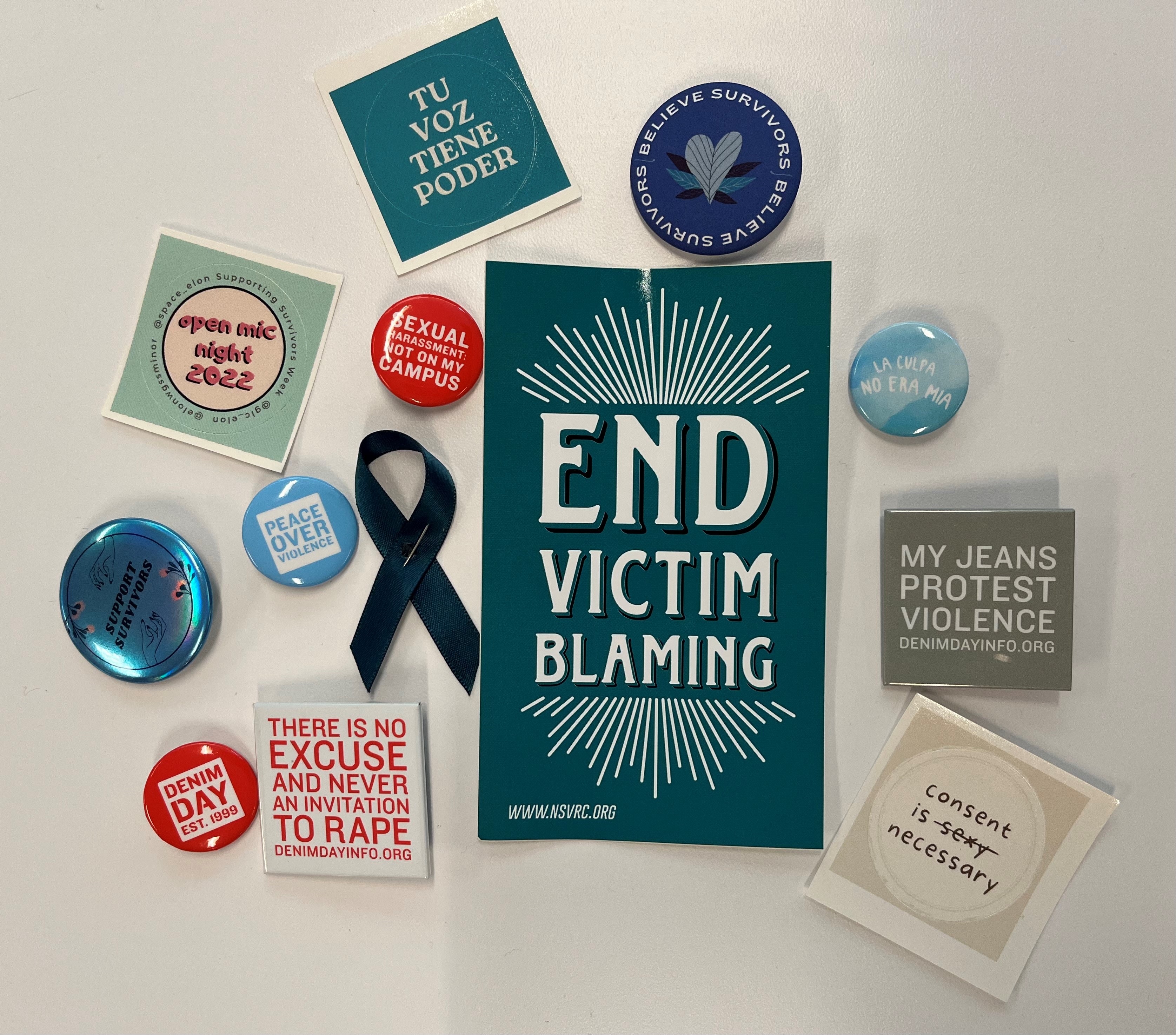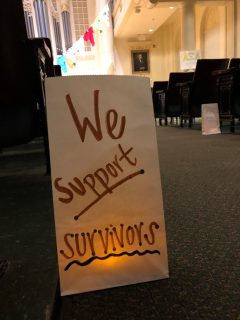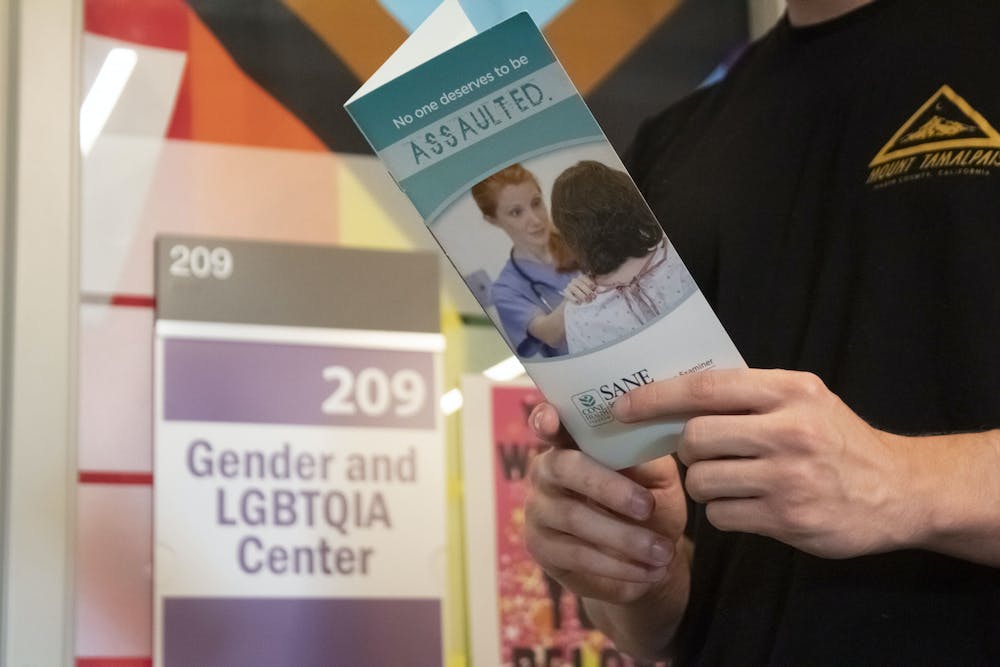The grant to the Gender & LGBTQIA Center (GLC) from the Department of Justice's Office of Violence Against Women will support the expansion of Elon's efforts to reduce gender-based violence.
The Gender & LGBTQIA Center (GLC) has been awarded a grant of nearly $300,000 from the Department of Justice’s Office of Violence Against Women to expand efforts to reduce sexual violence, intimate partner violence and stalking, collectively referred to as gender-based violence.
The grant proposes a project titled “Elon: Connect. Prevent. Transform.” that will build capacity and enhance the quality of gender-based violence prevention and response for all students, especially those with LGBTQ+ and BIPOC (Black, indigenous and people of color) identities, on Elon’s campus during the next three years. The activities of the grant will address three main goals:
- To improve gender-based violence service coordination by enhancing collaboration and training among campus and community agencies;
- To enhance knowledge of survivor resources and improve the accessibility of services for survivors of gender-based violence, especially LGBTQ+ and BIPOC survivors;
- To build a student community knowledgeable about, and actively engaged in, the primary prevention of gender-based violence.

Becca Bishopric Patterson, associate director of the GLC, has been instrumental in acquiring the grant as the grant author and primary investigator. She will also supervise the project on behalf of the GLC.
“We have a strong desire from faculty, staff, students and community partners to serve survivors well and expand prevention education, but are often limited by staff capacity,” said Patterson. She also stated that the grant will allow the GLC to hire an additional full-time professional, an assistant director for violence prevention and training, to oversee projects to reach the goals outlined in the grant.
Patterson and AK Krauss, assistant director of the GLC for violence response, will supervise the new assistant director for violence response. The team will work to expand and strengthen the university’s existing programming and resources.
“Elon has a long and sustained history of providing resources and support for those who have experienced sexual violence, relationship abuse, or stalking and prioritizing prevention education for the campus community,” Patterson said. “President Book has continued President Emeritus Leo Lambert’s tradition of condemning all forms of gender-based violence during fall Convocation for incoming students and families, expressing her personal commitment to improving the campus climate and communicating the expectation that each student will do the same.”
 Other efforts to reduce gender-based violence include Elon’s presidentially-appointed council, the Sexual Assault and Gender Issues Council, which looks for trends and recommends policy, protocol, and programming enhancements. The university is also an active member of the North Carolina Coalition Against Domestic Violence and North Carolina Coalition Against Sexual Assault. Currently, the university employs full- and part-time staff to support students, address reports of gender-based violence and prevent future violence through educational programs conducted by the GLC and Title IX office.
Other efforts to reduce gender-based violence include Elon’s presidentially-appointed council, the Sexual Assault and Gender Issues Council, which looks for trends and recommends policy, protocol, and programming enhancements. The university is also an active member of the North Carolina Coalition Against Domestic Violence and North Carolina Coalition Against Sexual Assault. Currently, the university employs full- and part-time staff to support students, address reports of gender-based violence and prevent future violence through educational programs conducted by the GLC and Title IX office.
The GLC and Title IX staff provide presentations, workshops, and panels each year to student leaders, faculty and staff departments, residence halls, student organizations, and community partners. Educational programming aims to prevent violence, promote a healthy and just campus culture, and challenge rape culture. Examples of programming include the following:
- Coalition for Learning, Empowerment and Anti-Violence Resources (CLEAR)
CLEAR is a student program coordinated by the GLC that intentionally collaborates across academic and administrative departments, and student organizations to coordinate regular programs and workshops. This group specifically partners with SPARKS Peer Health Educators and the Family Abuse Services LINCS, supported by the Kernodle Center for Civic Life. CLEAR students are also trained to facilitate peer-led workshops on supporting survivors, healthy relationships, masculinities, consent, bystander intervention, and campus resources. Programs and events hosted by CLEAR students include Supporting Survivors Week, Take Back the Night, a #MeTooElon display, the Clothesline Project, trauma-informed yoga, the Men’s Leadership for Gender Equity Conference, and documentary screenings. - Sexual Assault Prevention (SAP)
SAP is an interactive online tutorial about gender-based violence completed by all incoming (first-year, transfer and graduate) students. - Speak About It
“Speak About It” is a 75-minute skit and debrief on sexual violence and sexual citizenship conducted during New Student Orientation (NSO). “Speak About It” is explicitly LGBTQ+ affirming, using inclusive language and scenarios.
 Elon also offers various resources for survivors of sexual assault, relationship violence and stalking, including 24/7 confidential support and advocacy. Confidential support and advocacy services include safety planning, which encompasses explaining processes and resources available, such as reporting and filing protective orders. Confidential support and advocacy services also include assisting with housing, academic, and social support, accompaniment to the hospital for forensic evidence exams and relevant judicial bodies, such as local courts, police departments, and Title IX meetings, and referring students to campus and community resources, such as counseling, legal and medical services. These services are provided through SafeLine, a 24/7 confidential support phoneline, and the full-time assistant director for the GLC for violence response. All SafeLine staff are trained and have experience serving survivors and secondary survivors.
Elon also offers various resources for survivors of sexual assault, relationship violence and stalking, including 24/7 confidential support and advocacy. Confidential support and advocacy services include safety planning, which encompasses explaining processes and resources available, such as reporting and filing protective orders. Confidential support and advocacy services also include assisting with housing, academic, and social support, accompaniment to the hospital for forensic evidence exams and relevant judicial bodies, such as local courts, police departments, and Title IX meetings, and referring students to campus and community resources, such as counseling, legal and medical services. These services are provided through SafeLine, a 24/7 confidential support phoneline, and the full-time assistant director for the GLC for violence response. All SafeLine staff are trained and have experience serving survivors and secondary survivors.
The university partners with community-based organizations to provide survivors with support resources, such as confidential survivor advocacy, safety planning, assistance filing protective orders, court advocacy, emergency housing resources, and onsite referrals and connections to legal services. These organizations include the CrossRoads Sexual Assault Response and Resource Center, Family Abuse Services of Alamance County, and the Family Justice Center of Alamance County. Other campus resources include the Title IX Office, Elon University Police, the Town of Elon Police Department, Counseling Services, and Student Health Services.
The grant activities will enable Elon to increase collaborative services, deepen the expertise of campus and community partners, reach students with population-specific education and resources, and prioritize building capacity to serve and engage LGBTQ+ and African-American/Black, Latinx/Hispanic, Asian/Pacific Islander, Native American, Alaskan Native, and Multiracial students by expanding peer education efforts, and expanding and increasing access to resources.
“We will bring campus and community partners who serve victim-survivors together to brainstorm creative solutions for reaching students in new ways and giving these professionals opportunities to deepen their knowledge on cultural humility, cyber-stalking, sex trafficking, and many other important topics related to sexual and interpersonal violence,” Patterson stated.
The GLC anticipates that the job posting for the new assistant director will be published by the end of the fall 2022 semester, with grant activities beginning in spring 2023.



